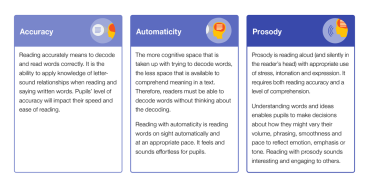Key Stage 3 (KS3) Reading Fluency Project: the importance of teaching fluency
‘Pupils who are struggling with reading need help. Comprehension suffers when pupils cannot read words accurately and fluently. Pupils who are struggling to read the words on a page find that their working memory is overloaded. They can’t make sense of what they read, can’t recall previous content, and so fall behind in any subject that requires reading.’
Gill Jones, Deputy Director, Schools and Early Education, Ofsted on reading in secondary schools and supporting weaker readers, April 2022
Many struggling readers in lower key stage 3 lack the fluency required to extract meaning from age-related texts. While they may have adequate phonic knowledge, their accuracy and automaticity is not yet good enough to allow them to decode at a sufficient rate to approach more challenging texts with fluency and, as a consequence, their ability to comprehend the text is weakened. Their cognitive load is burdened with the demands of crunching through the words on the page, and as a result, there is little cognitive space left for comprehending demanding texts. Moreover, they lack the prosody needed to make sense of the words and phrases they are reading. The cumulative effect of the challenges they face can be demoralising, resulting in students lacking the motivation they need to read more and preventing them from getting the practice they require to improve.
In the 15 years that I’ve been a Head of English, I have never experienced such insightful training on understanding and helping struggling readers - until we took part in the HFL KS3 Reading Fluency Project. The gains have been incredible.
Iain Skinner, Assistant Headteacher, Lister Community School, London Borough of Newham
Read our blog KS3 (Year 7) Reading Fluency Project: text selection guidance
Read the Reading Fluency Glossary produced in collaboration between the Education Endowment Foundation (EEF) and HFL Education for more detail on the terms ‘accuracy’, ‘automaticity’ and ‘prosody’.
For a more detailed description of the terms used in the Key Stage 3 (KS3) Reading Fluency Project, read our blog ‘Reading Fluency: how do I teach that?’
Key Stage 3 (KS3) Reading Fluency Project: core teaching strategies
The Key Stage 3 (KS3) Reading Fluency Project skilfully incorporates the strategies of modelled expressive reading, echo reading, repeated reading, performance reading, text marking, challenging text selection and modelling comprehension skills, to improve the trajectory of Year 7/8 students towards age-related expectations in reading.
Precise assessment data is collected at the start and end of the 8-week project for participating students so accelerated progress can be clearly tracked and celebrated
For a more detailed description of some of the strategies used in the Key Stage 3 (KS3) Reading Fluency Project and links to academic research that informed our approach, read our blog ‘A field guide to reading fluency: a reader's digest of our work to date’
What will I learn by participating in this project or programme?
You will be equipped with the knowledge and skills to implement the project successfully to support those students who are working below year group standards in reading and will be able to share this learning with colleagues to ensure that improved progress is secured for more students beyond the initial project student group.


